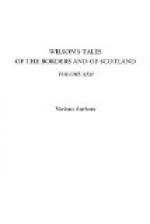On the first glance which he obtained of his mistress’s countenance, John saw, with a feeling of disappointment that lengthened his own several inches, that the interview had not been a satisfactory one. His native sense of politeness, however, and of the deference due to his mistress, prevented him making any inquiries as to what had passed until she should herself choose to communicate with him on the subject. For such communication, however, he had longer to wait than usual; for, lost in thought and depressed with disappointment, Lady Rae walked on a good way without taking any notice whatever of her attendant, who was following at a distance of several yards. At length she suddenly stopped, but without turning round. This John knew to be the signal for him to advance. He accordingly did so, and, touching his bonnet, waited for the communication which it promised.
“I am afraid, John,” now said Lady Rae—“I am afraid we shall be disappointed, after all. The general has made the strangest proposal you ever heard. He says that he cannot, without compromising himself, or to that effect, liberate his lordship from jail; but that if he were once out—that is, if he could be got out by any means—he would save him from being further troubled, and would grant him a protection under his own hand. But how on earth are we to get him out? It is impossible. These two guards at the door, besides other difficulties, render it altogether impracticable. I know not what is to be done.”
It was some seconds before M’Kay made any reply. At length—
“I’ll no think ta difficulty fery crate, after all, my letty,” replied John. “There’s shust ta bodachan at ta dore, I could put in my sporran, and ta twa soger.”
“Yes, John; the first you might perhaps manage,” said Lady Rae, smiling, and glancing unconsciously at the huge figure of her attendant, which presented so striking a contrast to that of the little, slim, crusty turnkey; “but the two soldiers—”
“Whoich,” exclaimed John contemptuously; “if’s no far prettier men than was there yesterday, it’ll no trouble me much to manage them too, my letty. A wee bit clamsheuchar wi’ my Lochaper axe, or a brog wi’ my skean-dhu, will make them quate aneuch, my letty. Tat’s but a small shob.”
“John, John, no violence, no violence!” exclaimed Lady Rae, in great alarm at the sanguinary view of the process for her husband’s liberation which John had taken. “No violence. If his lordship’s liberation be attempted at all, there must be no violence; at least none to the shedding of blood, or to the inflicting the smallest injury on any one. The idea is horrible; and, if acted on, would only make matters worse. Your own life, John, would be the forfeit of such an atrocious proceeding.”
“Foich, a figs for tat, my letty, beggin’ your lettyship’s pardon,” replied John, a good deal disappointed at the peaceful tone of his mistress, and at the loss of an opportunity, such as he had long desired, of taking vengeance on his master’s guards and jailers. “Foich, a figs for tat, my letty, beggin’ your lettyship’s pardon,” he said. “I could teuk to the hills in a moment’s notice, and see who’ll catch John M’Kay then.”




